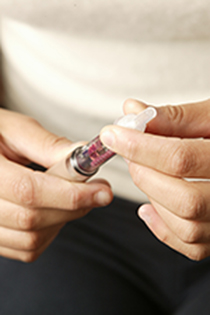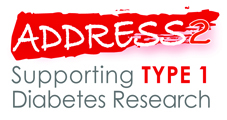ADDRESS-2 exists to support research involving people who have recently been diagnosed with type 1 diabetes, whilst being careful not to place additional burden at what can be a very difficult time for people and their families.
Full details on the process of joining ADDRESS-2 and how it will help you to get involved in research can be found at the ‘How to and next steps’ page, but it should not involve more than two brief appointments to provide some information and agreeing to be offered further opportunities to take part in research.
These will all be looked through to make sure they are suitable, and no one involved with ADDRESS-2 will ever put pressure on you to take part in anything you aren’t keen on.
A list of some of the studies currently using ADDRESS-2 to recruit can be found here, and this clearly describes what’s involved and what the aim of the study is in each case.
To give a sense of what may be offered, please find three examples of past studies below. Each describes what the aim was, what ADDRESS-2 participants were asked to do and what was discovered (if the results have been released!):
MonoPepT1De
Aim: To find out whether a proinsulin peptide could be used to train the immune system in a similar way to the way immunisations work to slow or halt the destruction to insulin-producing beta cells.
What taking part involved: Anyone referred from ADDRESS-2 attended a screening visit to assess if they could take part in the study. Those who could then attended a clinic to receive an injection of the peptide either every two or four weeks for six months
Results: This study has published results in a detailed research article here. It showed the treatment was safe and even hinted that the new treatment might help people to keep making some of their own insulin.
Other studies are now looking at training the immune system this way, as part of the work of the UK’s Immunotherapy Consortium , which ADDRESS-2 is part of.

Type 1 Diabetes Genetic Risk Score
Aim: Dr Kashyap Patel and Prof Andrew Hattersley from the University of Exeter requested access to DNA samples from ADDRESS-2 as part of their work on genetic risk scores for diabetes, to try and see if we can learn who will develop the condition from their genes.
What taking part involved: This research was done using samples ADDRESS-2 participants provided anyway, so nothing additional was required.
Results: Two detailed research articles were published using the information obtained from these samples in 2021. One of these found a gene which protects against type 1 diabetes and the other looked at people who develop type 1 diabetes later in life and the genes and autoantibodies that they had.
ADDRESS C-Peptide
Aim: The core ADDRESS-2 team carried out a study to collect urinary samples to measure C-peptide. We wanted to investigate the factors associated between different C-peptide measures of beta cell function with clinical, demographic, immunological, inflammatory and genetic characteristics of type 1 diabetes. We looked at people within the first year of diagnosis and also at different time points after diagnosis.
What taking part involved: This required taking two home urine samples. One was taken 2-hours after an evening meal, and the other before breakfast in the morning. Both samples were posted back to the labs to analysis. Participants recruited in the first year of diagnosis were asked to provide samples at 3, 6 and 12 months. People diagnosed for more than a year provided samples at a single time point after diagnosis.
Participants were also asked to complete a short questionnaire confirming their current insulin dose, weight, height and recent HbA1c. Adults were also asked to complete qualtiy of life questionnaires.
Results: Coming soon!

